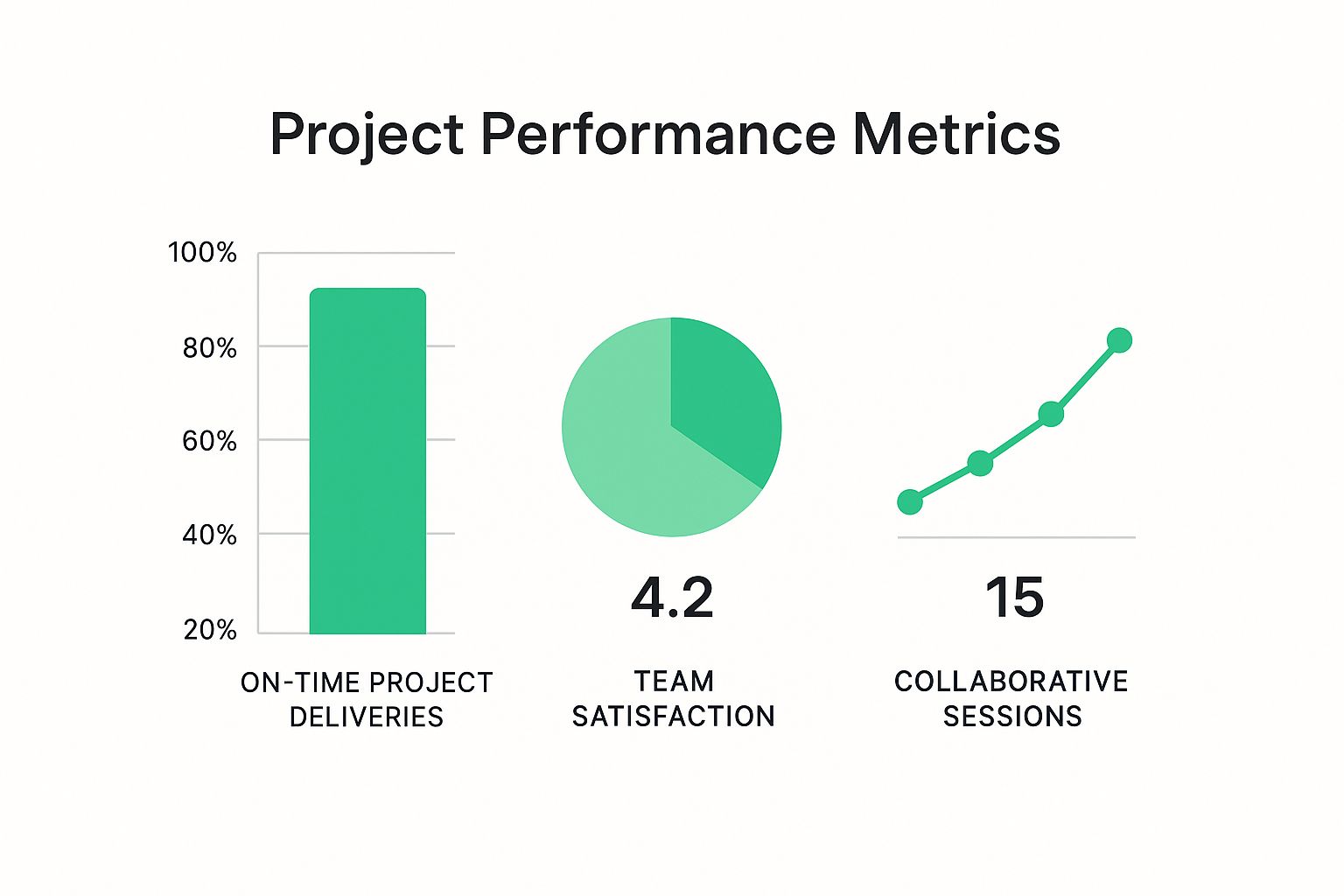Why Team Building Makes or Breaks Your Startup

In the fast-paced startup world, building a strong team is essential. Innovation and growth are key, but they depend on a cohesive and high-performing group of people working together. Team building isn't just a fun activity; it's a strategic move that can determine a company's success. Founders need to move beyond traditional corporate team-building exercises and embrace more agile, results-oriented strategies.
The High Stakes of Team Dynamics
Startups often face high pressure, limited resources, and constant change. A strong team can make all the difference in navigating these challenges. Effective team building creates open communication, trust, and a shared sense of purpose. This enables teams to make quick decisions and adapt to the ever-changing market.
Companies like Buffer and GitLab are prime examples. They've shown how strong teams can improve decision-making and create a culture of psychological safety. This, in turn, encourages innovation. This is a far cry from traditional corporate team building, which often lacks the flexibility and focus needed in a startup environment.
Investing in team cohesion early on is linked to better survival rates and faster growth. A unified team is more likely to overcome the challenges inherent in the startup journey.
The Impact on Retention and Satisfaction
Team building also significantly impacts employee retention and satisfaction. A surprising 52% of employees have left or considered leaving a job due to a lack of community. This highlights how important team building is for startups. Furthermore, 78% of people seek a more supportive work culture, emphasizing the need for collaborative and community-driven environments. For more detailed statistics, check out this resource: Team Building Statistics
From Co-Workers to Co-Creators
Effective team building transforms individuals from co-workers into co-creators. This happens when team members feel valued, heard, and empowered to contribute their unique skills. This fosters a sense of collective ownership, motivating everyone to work towards a common goal with passion and dedication. This shared purpose is vital for overcoming the obstacles that startups inevitably face.
The Agile Approach to Team Building
Traditional corporate team-building activities, like trust falls and icebreakers, often miss the mark for startups. Startups need agile, outcome-focused strategies. This might include workshops on communication, conflict resolution, or problem-solving. It's also important to create informal bonding opportunities, such as shared meals, off-site retreats, or social events. These experiences build genuine connections and the trust needed for effective collaboration.
Building a strong team isn't just a perk—it's a fundamental requirement for startup success. By prioritizing team building, founders can create a powerful engine for innovation, growth, and achieving their vision.
Building Real Connections in Remote and Hybrid Teams
Forget those awkward virtual happy hours. Let's explore what truly works for distributed startup teams. Building a strong team in a remote or hybrid environment requires a different approach than traditional in-person methods. It's about fostering genuine connections that go beyond geographical boundaries and time zones. This is especially crucial for startups, where rapid growth and agility often depend on distributed teams.
Replicating Spontaneous Connections
One of the biggest hurdles for remote teams is replicating the spontaneous interactions that often lead to innovation in a physical office. Think about those "water cooler moments"—those brief, unplanned chats that can spark breakthroughs. Leading startups are finding creative digital ways to recreate these valuable interactions. For example, some companies have introduced virtual co-working sessions, where team members work together online, creating a sense of shared presence and encouraging casual conversation.
Asynchronous Activities for Connection
But not all team building has to happen simultaneously. Asynchronous storytelling sessions, where team members share personal anecdotes or professional experiences through written or recorded formats, can cultivate deeper connections. This allows individuals to participate when it suits them and accommodates different time zones. This approach also benefits different communication styles, giving introverted team members a less pressured environment to share their thoughts and experiences.
Combating Zoom Fatigue
It's also important to address Zoom fatigue. Constant video calls can be exhausting. Successful remote teams prioritize activities that reduce screen time while maximizing engagement. Think virtual escape rooms, online games, or even collaborative creative projects. These activities offer a break from work and encourage team members to interact in a more relaxed and informal setting.
The Rise of Remote and Hybrid Work
The evolving nature of work has made these strategies crucial. The growth of hybrid and remote work has significantly changed how startups approach team building. By 2023, 25% of all professionals in North America were projected to be working remotely, highlighting the growing need for virtual team-building activities to maintain engagement and a sense of community. Find more detailed statistics here. This shift underscores that effective team building is not just a nice-to-have; it's a vital strategy for promoting collaboration and tackling challenges like digital fatigue and loneliness among remote workers.
Practical Frameworks for Remote Team Building
Building strong remote teams requires deliberate effort. Startups should establish consistent communication patterns, create opportunities for social interaction, and cultivate a culture of trust and transparency. Regular virtual coffee breaks, online team lunches, and virtual team-building games can help foster informal connections. Leaders need to prioritize creating virtual spaces where team members can connect personally. Establishing virtual rituals, such as a weekly online coffee break or a monthly virtual team lunch, can help maintain team energy and morale.
Honest Insights: What Doesn't Work
Finally, it's important to be realistic about what doesn't work. Generic, one-size-fits-all virtual team-building activities often fail. Forced fun rarely leads to genuine connection. Instead, concentrate on creating authentic opportunities for team members to connect on a human level. Understanding individual needs and preferences is crucial for designing team-building experiences that resonate and have a lasting positive effect. By focusing on building real connections, startups can unlock the full potential of their remote and hybrid teams.
Essential Strategies for Cash-Strapped Early Stage Teams

For early-stage startups, resources are often limited. This requires founders to be incredibly resourceful when building their teams. The initial stages of startup team building demand a unique approach. It's less about expensive retreats and more about fostering a strong, unified team with limited resources. This means prioritizing cost-effective strategies with maximum impact.
Establishing Communication Rhythms
Open and consistent communication is the foundation of any successful team. This is especially true for cash-strapped startups. Regular team meetings, even brief daily check-ins, keep everyone on the same page. These quick updates are crucial for maintaining momentum and quickly addressing obstacles.
Establishing designated communication channels for specific purposes is also vital. This prevents information overload and ensures important updates are noticed. This transparent approach minimizes costly miscommunications.
Building Psychological Safety in High-Stress Environments
Early-stage startups are inherently high-pressure environments. Creating a psychologically safe space where team members feel comfortable taking risks and sharing ideas is essential for driving innovation.
This can be achieved through open dialogue, active listening, and celebrating both successes and failures. Encouraging constructive feedback and creating opportunities for mutual learning fosters trust and resilience within the team.
Onboarding New Hires Into the Chaos
Integrating new hires into the often chaotic world of an early-stage startup requires a structured approach. Clearly defined roles, even if they are fluid and change quickly, provide a much-needed sense of purpose.
Pairing new team members with experienced mentors offers guidance and support. This helps integrate new hires quickly, maximizing their contributions from the start.
Maintaining Morale During Setbacks
Setbacks are inevitable in the startup journey. Maintaining team morale during these challenges requires strong leadership. Open communication about the difficulties and the plan to overcome them is essential.
Celebrating small victories, even amidst larger setbacks, keeps the team motivated and focused on the long-term vision. You might be interested in: How to master startup equity with our calculator.
Building Trust for Rapid Decision-Making
Trust is the bedrock of any high-performing team. In the fast-paced startup environment, trust facilitates quick decision-making. This is crucial for adapting to market shifts and seizing opportunities.
Creating opportunities for collaborative work on challenging projects builds trust through shared experience. Recognizing and rewarding these collaborative efforts reinforces the importance of teamwork.
Practical Frameworks for Role Clarity
As responsibilities frequently shift in early-stage startups, maintaining role clarity is paramount. Develop clear job descriptions, even if they are subject to change, and regularly review these descriptions with team members. This provides a framework for accountability and minimizes confusion about individual responsibilities.
Celebrating Wins to Maintain Momentum
Celebrating wins, both large and small, keeps momentum going, especially during challenging periods. These celebrations don’t need to be extravagant. A simple team lunch, a handwritten thank-you note, or public acknowledgment of a team member's contribution can significantly boost morale.
Recognizing achievements reinforces positive behaviors and fosters a culture of appreciation. By implementing these cost-effective startup team-building strategies, early-stage companies can build strong team dynamics, foster innovation, and increase their chances of success.
To illustrate different approaches for various stages, consider the following table:
Early-Stage vs. Growth-Stage Team Building Approaches: A comparison of team building strategies, budget allocations, and priorities between different startup phases.
| Stage |
Budget Range |
Primary Focus |
Key Activities |
Success Metrics |
| Early-Stage |
Low to Minimal (DIY, bootstrapped) |
Team cohesion, foundational trust, open communication |
Frequent check-ins, informal gatherings, shared project ownership, mentorship |
Strong team morale, quick problem-solving, efficient workflows |
| Growth-Stage |
Moderate to High (Dedicated budget) |
Scaling team processes, reinforcing culture, skill development |
Formal team-building events, training programs, leadership development initiatives, structured onboarding |
Employee retention, high performance, positive company culture, successful scaling of team processes |
This table highlights how team-building strategies and budget allocation shift as a startup evolves. Early-stage teams prioritize foundational elements like trust and communication, while growth-stage teams focus on scaling and reinforcing company culture. Both stages benefit from celebrating successes and acknowledging contributions, but the methods and resources employed differ.
Smart Technology Choices That Bring Teams Together
Collaboration is the lifeblood of today's startup scene. Yet, the abundance of available tools can be paralyzing. This exploration focuses on how growing startups are strategically integrating technology to bolster, not substitute, human connection. We’ll examine platforms that cultivate authentic collaboration and differentiate them from those that simply contribute to digital noise.
Avoiding Tool Fatigue and Maximizing Impact
For startups, selecting the right technology significantly impacts team cohesion. The objective is to identify tools that simplify communication and workflows, not complicate them. This necessitates careful consideration of each platform's potential to enhance team building and overall productivity.
For example, project management software that promotes transparency and shared ownership can strengthen team dynamics. Communication platforms that accommodate both formal and informal interaction can also cultivate stronger relationships.
However, an overabundance of tools can result in tool fatigue, diminishing productivity and team morale. Startups need to be discerning about their technology stack, selecting platforms that integrate seamlessly and align with their specific requirements. This focused strategy maximizes the positive influence on team building.
AI-Powered Tools for Team Insights
AI is reshaping how startups approach team building. AI-powered tools can offer valuable perspectives on team dynamics, assisting in identifying collaboration patterns and potential communication gaps. This is particularly beneficial for remote and hybrid teams where direct observation is limited.
AI can analyze communication data to pinpoint who is collaborating effectively and where bottlenecks may exist. This data-driven approach allows startup leaders to proactively address communication issues before they escalate, improving team performance and fostering a stronger sense of connection.
AI can also personalize team-building activities by identifying individual preferences and learning styles. This tailored approach can boost engagement and create more meaningful team experiences.
Real Examples of Technology in Action
Many successful remote-first companies are already using technology to maintain their culture as they scale. They utilize virtual reality platforms to create shared experiences, online whiteboards for collaborative brainstorming, and communication tools that champion transparency and real-time feedback. Some even utilize AI-driven platforms to analyze team communication and identify potential conflicts early.
These examples demonstrate how technology can amplify human interaction, spanning geographical distances and fostering meaningful connections. Learning from these examples enables startups to develop their own unique strategies for maximizing technology’s influence on team cohesion. The increasing use of collaboration tools has been a key factor in the evolution of team building within startups.
The global collaboration tools market is projected to grow from $39,407.4 million in 2023 to $116,338.4 million by 2033, with a CAGR of 11.4%. This rapid expansion underscores the growing reliance on technology to bridge distances and support hybrid and remote teams. Explore this topic further.
Practical Guidance for Startups
Selecting the right tools is just the starting point. Startups must cultivate a culture that encourages their use and integrate them seamlessly into daily workflows. This requires clear guidelines, ongoing support, and consistent feedback.
Furthermore, it's crucial to remember that technology is a tool, not a substitute for human connection. Startups should balance virtual connections with in-person activities whenever possible, maximizing the benefits of both. This balanced approach ensures that technology fulfills its purpose: to bring teams closer.
Scaling Culture Through Intentional Team Experiences

As your startup expands, preserving its unique culture can become a real challenge. Culture isn't just something written down or talked about on Slack; it's lived and breathed through the experiences your team shares. This is where intentional team building becomes essential for scaling your startup's culture.
Identifying Your Cultural Core
First, identify the specific behaviors and mindsets that truly define your startup. What values are most important? What sets your team apart?
Perhaps it's a commitment to customer satisfaction, a focus on innovation, or a culture of open communication. These core cultural elements form the bedrock for designing effective team-building activities.
Designing Experiences That Reinforce Values
Next, create team experiences that genuinely reinforce those identified values. These activities should feel authentic and reflect your startup's DNA, not forced or artificial.
If collaboration is key, design projects that require close teamwork. If creativity is paramount, organize brainstorming sessions or design thinking workshops.
Learning From Successful Startups
Many successful startups have scaled their culture effectively. They often establish cultural rituals that become deeply ingrained in their team's identity.
These might include weekly team lunches, monthly all-hands meetings, or annual off-site retreats. These rituals reinforce company values and help new hires quickly integrate into the existing culture.
Recognizing and Addressing Cultural Drift
As startups grow, cultural drift can happen. This means the original values and behaviors start to shift or fade. This can stem from factors like rapid growth, leadership changes, or external market pressures.
Recognizing the warning signs of cultural drift is crucial. These can include decreased employee engagement, increased conflict, or a decline in product quality. When these signs emerge, practical interventions are essential.
Creating Cultural Rituals
Cultural rituals help prevent cultural drift. They provide regular opportunities for team members to connect and engage with the company's values.
These rituals can be simple, such as weekly coffee breaks, monthly all-hands meetings, or annual company retreats. The key is to create meaningful and memorable experiences.
Practical Interventions for Course Correction
If cultural drift has already taken hold, specific steps can help realign your team. This could involve workshops to remind employees of the company's values, team-building activities focused on reinforcing desired behaviors, or leadership training to ensure managers effectively communicate the culture. Further reading: Building a Startup Team
Building a Sustainable Culture
Investing in intentional team building allows startups to effectively scale their culture. This ensures that their values and beliefs remain strong as they grow.
Research shows that companies with defined cultural values and regular team experiences see 40% higher employee satisfaction and 67% lower turnover in their first two years of scaling. Read the full research here. This demonstrates the significant impact of intentional team building. This creates a more engaged, productive, and innovative team, contributing to the company's long-term success. It’s a strategic investment that pays off.
Measuring Team Building ROI Beyond Feel-Good Metrics
Demonstrating the value of startup team building goes beyond simply saying everyone enjoyed themselves. It requires showcasing a tangible return on investment (ROI). This means moving beyond subjective measures like "team spirit" and focusing on data-driven insights directly linked to startup success.
Leading Indicators of Team Performance
Several leading indicators can predict team performance. These are measurable factors that change before significant shifts in overall performance. Tracking these indicators provides early insights into the effectiveness of your team-building activities.
Collaboration Frequency: How often are team members working together on projects? Increased collaboration often points to better communication and coordination.
Cross-Functional Project Completion Rates: Are projects involving multiple departments completed on time and within budget? This metric reveals the efficiency of inter-team collaboration.
Team Member Communication Patterns: Analyzing communication channels like Slack can reveal valuable insights into team dynamics and information flow.
Speed of Decision-Making: How quickly does the team reach consensus and make key decisions? Streamlined decision-making leads to greater agility.
Establishing Realistic Benchmarks and Tracking Progress
It’s crucial to establish realistic benchmarks based on your startup's specific stage and industry. Comparing your metrics to those of established companies might not be relevant. Instead, focus on measuring your own progress and improvement over time.
Regularly track these metrics and analyze any emerging trends. Consistent monitoring helps you understand what strategies are proving effective and where adjustments might be needed. This data-driven approach ensures your team-building strategies are optimized for maximum impact.
The following infographic illustrates the positive relationship between on-time project deliveries, average team satisfaction, and the number of monthly collaborative sessions:

As the data suggests, more collaborative sessions correlate with both higher team satisfaction and better on-time project delivery rates. This reinforces the concept that fostering collaboration directly and positively impacts overall team performance.
Gathering Honest Team Feedback and Analyzing Data
Collecting honest team feedback is essential for truly understanding how effective your team-building efforts are. Anonymous surveys, regular check-ins, and dedicated feedback sessions can provide invaluable insights.
Analyzing communication patterns can also bring hidden team dynamics to light. Are there communication silos within the team? Are certain team members being excluded from critical conversations? This information can then inform more focused and targeted interventions.
Connecting Team Building to Bottom-Line Outcomes
The ultimate goal of measuring team building ROI is to demonstrate how these initiatives affect your startup's bottom line. Connect your team-building investments to tangible outcomes like:
Retention Rates: Do employees stay longer after team-building initiatives are implemented? Reducing employee turnover is a significant cost saving.
Productivity Gains: Has team productivity improved as a result of these efforts? Measure output, efficiency, and project completion rates.
Innovation Metrics: Has team building fostered more creative ideas or contributed to the development of new products or features? These are critical growth drivers for startups.
To further illustrate how to connect team building to business outcomes, let's review some key metrics and measurement methods:
To further illustrate this connection, consider the following table:
Team Building Success Metrics and Measurement Methods
| Metric |
Measurement Method |
Frequency |
Target Range |
Business Impact |
| Retention Rate |
Employee Turnover Data |
Quarterly |
<5% |
Reduced recruitment and training costs |
| Productivity |
Output per Employee, Project Completion Rate |
Monthly |
10-15% increase |
Increased revenue and profitability |
| Innovation |
Number of New Ideas Generated, New Product Launches |
Quarterly |
2-3 new products/year |
Market leadership and competitive advantage |
By tracking and analyzing these metrics, you can clearly demonstrate the tangible value of startup team building to stakeholders. This data-driven approach shows that investing in your team is not merely a "feel-good" expense, but a strategic investment in your startup's future. It provides concrete evidence of how team building creates a more productive and positive work environment, strengthening the argument for continued investment in team development.
Key Takeaways
Building a strong startup team isn't about trust falls or extravagant off-sites. It's about cultivating a collaborative environment built on trust and a shared vision. This requires a strategic approach tailored to your startup's current stage and available resources. This section breaks down the most effective strategies into actionable steps you can implement immediately, regardless of whether you're bootstrapping in your garage or scaling to a thousand employees.
Prioritizing for Different Startup Phases
Your team-building focus should adapt as your startup evolves. In the initial stages, when resources are often limited, prioritize establishing clear communication channels and fostering psychological safety. Regular check-ins, even brief daily stand-ups using tools like Slack, help keep everyone aligned. Open communication, where team members feel comfortable sharing both ideas and concerns, is essential, particularly during stressful periods.
As your startup matures and resources become more available, shift your focus towards scaling your company culture and leveraging technology to maintain connection. Planned team-building activities, such as regular team lunches or company retreats, can reinforce company values and build camaraderie. Strategic technology choices can streamline communication and collaboration, especially for remote or hybrid teams.
Realistic Timelines and Common Pitfalls
Building a strong team takes time and consistent effort. Don't expect to see changes overnight. Focus on implementing sustainable practices that will produce long-term benefits. For example, a newly implemented communication strategy might take several weeks to become fully integrated into the team's workflow. Likewise, building trust requires ongoing effort and demonstrated commitment.
Avoid common pitfalls that can waste valuable time and resources. Generic team-building activities often fail to resonate with startup teams. Instead, customize activities to your team's unique needs and interests. Also, avoid over-relying on technology. While collaboration tools like Asana can be helpful, they should not replace genuine human interaction. Learn more in our article about How to build a strong team.
Practical Steps for Immediate Implementation
Start with the fundamentals. Clearly define your team's core values and make sure everyone understands their roles and responsibilities. Establish regular communication channels using tools like Microsoft Teams and actively encourage open feedback. Celebrate small victories to maintain momentum and boost team morale. As your team expands, introduce more structured team-building activities and invest in technology that enhances collaboration.
Sustainable Practices for Long-Term Growth
Focus on establishing sustainable team-building practices that adapt as your team grows. This involves regularly evaluating your strategies and making adjustments based on team feedback and performance data. For example, if a particular communication tool isn't effective, be open to trying a different approach. If team morale seems low, consider implementing activities that boost spirits and encourage connection.
Key Takeaway: Team Building Is an Investment
Team building isn't just a "nice-to-have"—it's a vital investment in your startup's success. By prioritizing team building, you create a more engaged, productive, and innovative workforce. This, in turn, fuels faster growth, improves decision-making, and increases the chances of achieving your startup’s vision. A unified team is better prepared to navigate challenges, adapt to changes, and drive innovation. As responsibilities shift, maintain role clarity by implementing regular review cycles. This reinforces individual accountability within the ever-changing environment of a startup. Celebrate milestones, both big and small, to maintain momentum and cultivate a culture that values every contribution. This approach fosters both individual and collective team development.
Investing in team building now will yield significant returns as you scale from startup to scale-up and beyond. Start today.
Ready to Build Your Dream Startup Team?
Finding the right co-founder can be instrumental in unlocking your startup's full potential. IndieMerger connects entrepreneurs with complementary skills, streamlining the process of building the perfect team. Our AI-powered matching algorithm simplifies the process of finding a co-founder, saving you valuable time and resources. Visit IndieMerger today and start building your dream team.